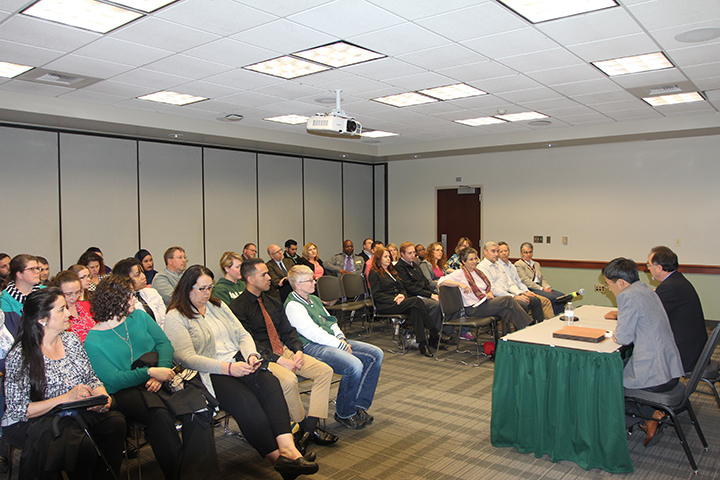By Rebecca Armbruster, Brenda Contreras and Ricardo Coronado
As part of the re-accreditation process, Sacramento State hosted a site visit by the Western Association of Schools and Colleges Senior College and University Commission (WSCUC) this week.
The WSCUC team hosted open meetings with students, faculty and staff Tuesday to provide an opportunity for input from all members of the campus community about their experiences with Sac State.
The team gathers and reviews information from institutional reports, on-campus interviews, open meetings and email comments to develop recommendations to the university.
Education policy has been the subject of debate between faculty and education administrators and has not subsided since the push for better graduation rates without possibly compromising a student’s educational development.
A forum in the University Union’s Redwood Room invited the faculty to make any informal input on their experiences within Sac State. A team of WSCUC members, led by UC Santa Cruz Chancellor George R. Blumenthal, ran the panel.
“We wanted to make sure we reach out to faculty because they are the that one that teaches students and advises them and the work that that gets done in the campus is done by the faculty,” Blumenthal said. “They are the one in the trenches.”
Faculty workload and the ratio between the students and faculty was topic of discussion brought up during the panel.
“It’s a difficult balance between teaching more students than to try to teach them effectively,” said history professor Jeffrey Dym.
Faculty hiring freezes, faculty development opportunities and proper incorporation of technology into the classroom were also discussed.
Some faculty members said that President Robert Nelsen brought new energy to the campus.
At the forum for staff members, there were about 30 from different departments throughout the university present, reflecting different areas of occupation at Sac State such as student housing, accounting technicians and professors, who were all present to share their experience as staff members.
One thing that most of the staff who spoke had in common was their enjoyment and passion of coming to work each day Sac State.
There was not a big turnout for the student open forum, as only six students were in attendance.
However, the four undergraduates and two graduate students that were present were able to speak about their personal experiences with Sac State and have that information relayed back to President Nelsen.
Kathi Ketcheson, the director of resource and planning at Portland State University, and Tamela Hawley, a WASC representative, were the two speakers at the forum asking the students their perspectives about Sac State and what needs improvement.
The WSCUC, a national entity, has divided itself into voluntary accreditation groups in different regions of the country.
Their purpose is to ensure the quality of the education that students receive. Institutions are not required to belong to these, according to Ketcheson.
Different regions have different cycles for preparing reports. A team of volunteers or peers reads the report and makes comments. Then the team comes to the campus to peer-review the university.
WSCUC provides the university with recommendations on what needs improvement. A school that needs much improvement might have its accreditation revoked.
“We don’t say you have to do this or you have to do that,” Ketcheson said. “We really just want to talk to people and find out how things are going on the campus.”
Students mainly expressed concerns about not being able to get into the classes they need due to impacted majors and the lack of communication between faculty and students, especially in advising transfer students.
Another expressed concern was that the hours of operation for student service centers were not accommodating to student’s schedules.
“Our student support services are from 9 a.m. to 5 p.m. and that doesn’t work for many students,” said sophomore Karen Kaur Dhillon. “Although those services are here, they are not accessible to everyone.”





























































































































